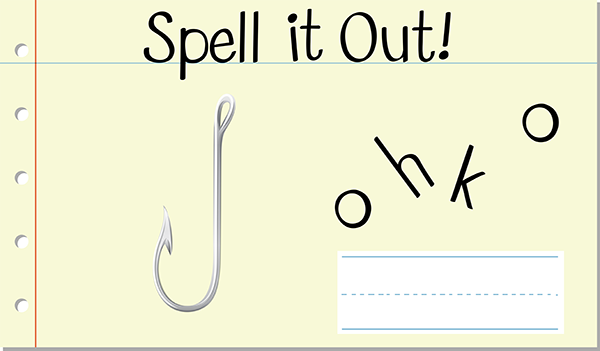
How Pronunciation and Spelling are Related
In any language, pronunciation and spelling are closely related.
This is the third article in our 5-part series about how to teach English spelling. Click here to read the main article.
Have you ever asked your adult students to simply repeat after you as you say a new vocabulary word? Your attempts to get them to imitate your pronunciation will probably be met with their sincere requests to “please write it on the board.” It’s true that they will be able to remember it better if they can see, hear, and speak the word; however, seeing the new word written can hinder their ability to pronounce it correctly.
As adult students learn to pronounce new words, they are very likely to “see” that word in their head as they say it. They need to be able to translate the sound they are saying into letters that they can “see.”
Can Phonetic Spelling Help Students Learn?
So how can you help students translate what they hear into correct spelling? First, please resist the temptation to use phonetic spelling in your lessons to help students learn how to pronounce a word. For example, don’t write “alfabet” for “alphabet.” Students need to learn the correct spelling of words so that they will be more confident in their ability to write and spell correctly. It will also improve their ability to “decode” new words they encounter as they read.
You may wish to use the International Phonetic Alphabet (IPA) with your students, especially if they have a different writing system. For more information about teaching with the IPA, click here.
How Do Children Learn Pronunciation?
Let’s take a brief look at how small children learn the sounds of their first language, years before they learn to write. We’ll translate that into ways adults can successfully learn new sounds and transform them into correctly spelled words.
Learning Correct Pronunciation Takes Time
It takes time for all speech sounds to be learned correctly. Until around age 7, a child can easily learn a new language with native-like pronunciation skills. Adults can learn new pronunciation skills, but for them it is more mechanical and requires more practice. Some of your adult students may be upset that they cannot lose the speech patterns of their first language, making them speak English with an accent.
Encourage your adult learners that having an accent is not a bad thing, as long as it is not so extreme as to hinder understanding. There are more non-native speakers of English in the world than there are native speakers. Even within the native speaker group there are many accents and regional variations of pronunciation and spelling.
How Children Learn Sounds
Most children generally learn speech sounds in the same order. This order will work for adults as well. The first sounds toddlers learn are the more common consonant sounds of p, b, t, d, g, k, m, n, ng, h, w, f, and the consonant sound of y. By this time, family members are usually able to understand a child’s speech.
The less common sounds are next, along with those that are a little more difficult – j, ch, s, z, l, v, and sh. At this stage, most people will be able to understand what the child is saying.
The English r is one of the last sounds to be learned, as is the voiced zh and th. The voiceless th is usually the last sound to be mastered. You can see that the sounds build on each other in complexity.
What About the Vowels?
So, where are the vowels in this learning sequence? For most English language learners, the most common errors are with consonant sounds. With the notorious exception of English short vowel sounds, long vowel sounds and diphthongs are generally more consistent from language to language.
Children Easily Learn the Sounds of Their First Language
It’s true that at birth, children have the ability to hear all of the nearly 800 sounds produced in languages around the world. This capacity becomes much more limited as a child grows to adulthood. For example, in many dialects of Chinese, the consonants l and r are frequently mispronounced. Many times, the speaker is not even aware of the difference in English between the two consonants. Of course, this makes spelling difficult.
Social Interaction Is Important For Both Children and Adults
I can’t over-emphasize the importance of engaging in conversation with your students to improve their pronunciation skills. This simple activity of face-to-face interaction with a native speaker will go a long way in improving comprehension and expression skills. The better their pronunciation, the easier it will be for them to translate that into correct spelling.
An Example of Why Face-to-Face Interaction is Important
In a 2003 study published in Scientific American magazine by Patricia K. Kuhl, nine-month-old babies whose families spoke English were exposed in person to native speakers of Mandarin Chinese for 12 sessions over a month’s time. These babies were able to pick up the new phonemes (sounds) of Mandarin as successfully as babies who were exposed to Mandarin daily from their parents. Babies who listened to video and audio recordings of Mandarin speakers did no better in producing these sounds than the control group of babies who were not exposed to Mandarin at all.
For sure, video and audio recordings can be valuable resources for ESL teachers who work with adults. Adults have the cognitive ability to organize and control their learning. But conversations with a native speaker remain the best way to learn the sounds of English spoken in the part of the world where students live.
So How Does All This Relate to Spelling?
If you’re like me, you’re often tempted to apologize to your students for the fact that how an English word is pronounced has little to do with the way it is spelled. It’s all about students being able to translate what they hear into letters they can write. When they can correctly speak what they hear, spelling will be a little easier.
But truthfully, at least half of English words do strictly obey conventional spelling rules. Many more words obey them for the most part. Common words that totally defy spelling logic are the words students usually learn in the first months of study; words like “does” and “night.”
Teaching Spelling in Relation to Pronunciation
Adult language students tend to love grammar and any other way they can provide order to this new system they are learning. They will usually beg you to teach them the rules of spelling.
First, teach them basic spelling rules that will unlock their understanding, such as the “long vowel with silent e” rule. Use the patterning skill that we discussed in the first article of this series to teach them the different possibilities of how a certain sound is spelled as new vocabulary is introduced.
If you have beginners, teach them the one most common way each new sound is spelled. As students progress, teach them more ways that same sound may be spelled.
I love to recommend that teachers use the dreaded dictation exercise, because it’s an extremely practical way to reinforce the new sounds and spelling rules that students have learned in that day’s lesson. With dictation, students need to listen to you say a sentence with correct pronunciation, then spell it correctly as they write it on their papers. Ask for brave volunteers to write their sentence on the board so the class can correct any mistakes together.
Don't Give Up!
Learning correct spelling takes time and practice. Just ask any American elementary school student if they enjoy spelling tests. Spelling bees (contests) as we know them in English-speaking countries are not common in other countries. Reassure your students that even adult native English speakers can have difficulty with consistent pronunciation and spelling.
Practice spelling new words in class, but don’t stress over it. It will come with time, and some students will become better spellers than others…just like native English speakers.
Leave a Comment!
Let me know if this article was helpful to you! Do your students have trouble with spelling? Have you wondered about the best way to teach spelling? Share your tips and strategies with other teachers! See you soon in the next article.
